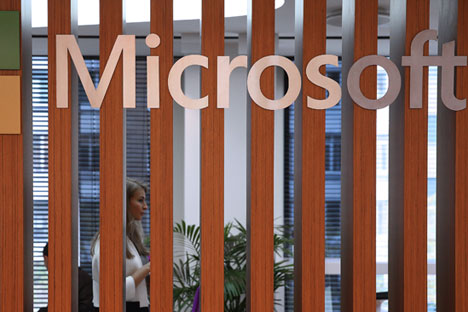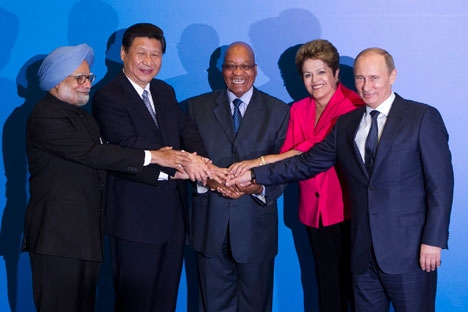Сan the BRICS beat Microsoft?

Source: TASS
Nobody likes a monopoly. That’s why many people around the globe dislike Microsoft. Check it yourself on Google. Type in, “Windows sucks,” and you’ll find many angry users who’d love to destroy one the world’s most successful companies.
Now, imagine you are the Russian government. All the state oil and gas corporations, as well as state agencies, are using software developed by a U.S. company. In addition, Google is strengthening its position in Russia. According to the latest data, its market share grew to 31.7 percent in the first week of November, boosted by pre-installed Google search engines on Android smartphones and on browsers. At the same time, the market share of the Russian search engine, Yandex, dropped to less than 60 percent for the first time in four years. And just to make you feel even more paranoid, Facebook announced it’s planning to conquer Russia through apps.
Develop new BRICS software
Sovereignty of the domestic high-tech sector and other protectionist measures were discussed at Russian Interactive Week (RIW 2014) in Moscow on November 12th – 14th.
Russia is working with the BRICS countries --- Brazil, Russia, India, China, and South Africa --- to de-monopolize the global software market, said Nikolay Nikiforov, Minister of Communications and Mass Media, in his speech at RIW. “We can’t isolate our country from Western IT products. The IT market is global, and we might face countermeasures that will hit us like a boomerang,” Nikiforov emphasized.
However, the stranglehold that a few companies have on the global software market will be challenged, he said. Consumers should have a choice, but de-monopolization of the global software market will take time and effort. “The monopoly is everywhere these days, it’s in every mobile phone, every computer. We want to de-monopolize at least half of the world’s market together with our colleagues from the BRICS.” According to Nikiforov, the Russian government is working on a number of measures, including subsidizing software developers and their client companies.
The priority will be “strategic software” that includes database management systems, engineering software, and geographic information systems. Nikiforov said the BRICS plan to discuss the issue at the 7th BRICS Summit in July 2015 in the Russian city of Ufa.
According to Nikiforov, this would provide an incredible, exciting geopolitical and export opportunity for software developers around the world. But industry representatives are skeptical. It’s just too late, they say. Even if the BRICS put their efforts together, they still won’t be able to compete with Microsoft, because they don’t have enough resources, expertise, and most importantly not enough qualified software developers.
“Market monopolization was obvious to industry professionals 20 years ago,’’ said Igor Agamirzyan, general director of the Russian Venture Company. ``We’ll just waste plenty of money and efforts. Russia should focus on future opportunities, such as digital health platforms and other potential drivers for our development,”
Is an Iron Curtain possible for the Runet?
“Something strange is happening,’’ one director of a large online company told me at RIW this week. ``The government shows us a lot of attention, and I am not sure if I should be happy or worried about it.”
Some time ago, the Kremlin confirmed it is working on measures to isolate the Russian Internet (Runet) in the event of an international crisis. There is also a new law, to take effect in 2016, which requires foreign Internet companies to store Russian citizens’ personal data within the country’s borders. This will affect social networks, Internet stores, and cloud services. Facebook, Google and Twitter have millions of users in Russia, but store data on servers outside the country.
Actually, this won’t be a problem for powerful high-tech corporations. They have enough money and resources to relocate their servers even to Siberia if they feel there’s profit for them there. I agree with Mikhail Gurevich, the head of 101 StartUp project: the law might hurt young Russian startup companies that target global markets.
“Will booking.com stop working in Russia? Rubbish!’’ Gurevich said at RIW. "But the law might kill some Russian startups. Young businesses can suddenly become popular in Japan or the U.S. Why would you store your data in Russia? All cool Russian startups want to be global."
What are the Russian government’s true intentions? Are they the good guys, fighting for our national independence or are they trying to put the boot on our free Internet? Personally, I believe they are trying to do both.
Firstly, they realize there is money and potential in the Russian Internet that has long enjoyed a lack of regulation. Free content, music, video, and online business can potentially generate profits for the state budget hit by sanctions and low oil prices. Secondly, Russian users’ data shouldn’t be stored outside the country. Unfortunately, there’s a global trend for governments all over the world to exercise control on our personal information. But technology is developing much faster than regulations. FireChat messenger, an application that works regardless whether Wi-Fi or mobile phone coverage is available, emerged in response to limitations on the Internet. We might witness a boom of such technology in the future.
Striving for profits: the Russian Post competes with eBay, while vKontakte searches for capital investment abroad>>>
All rights reserved by Rossiyskaya Gazeta.
Subscribe
to our newsletter!
Get the week's best stories straight to your inbox

